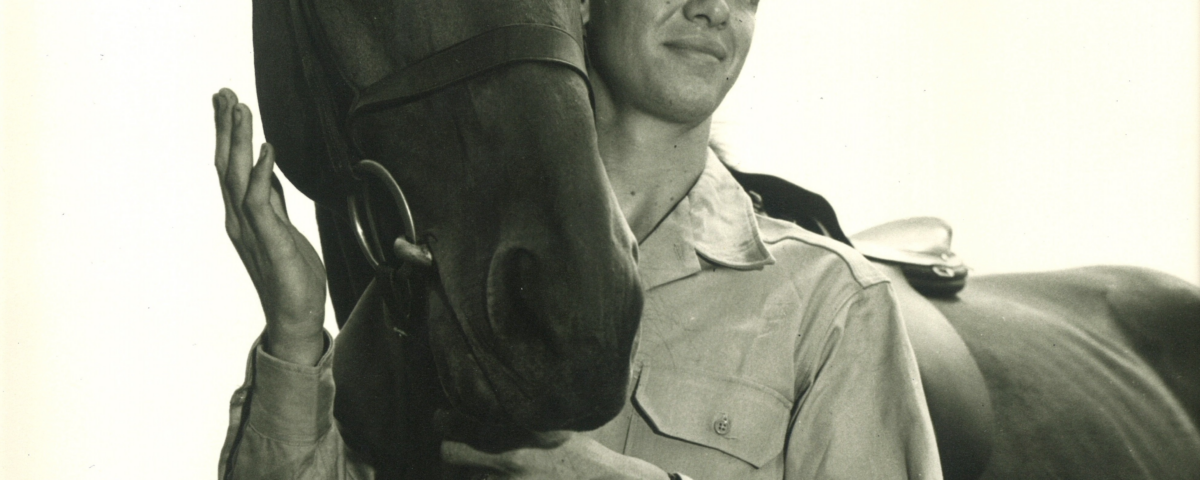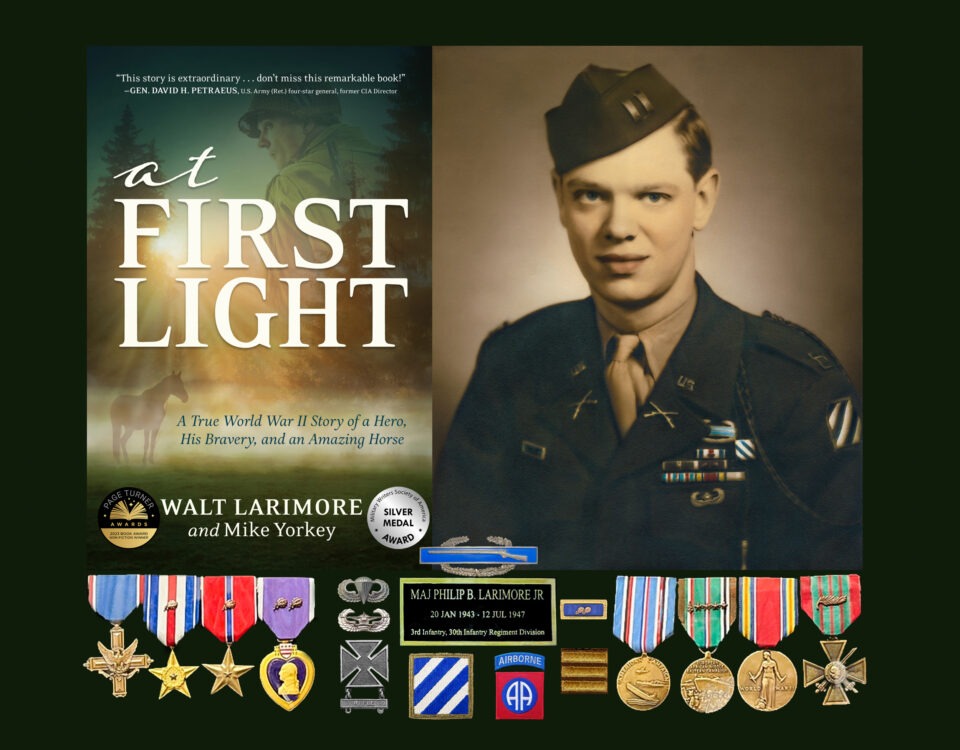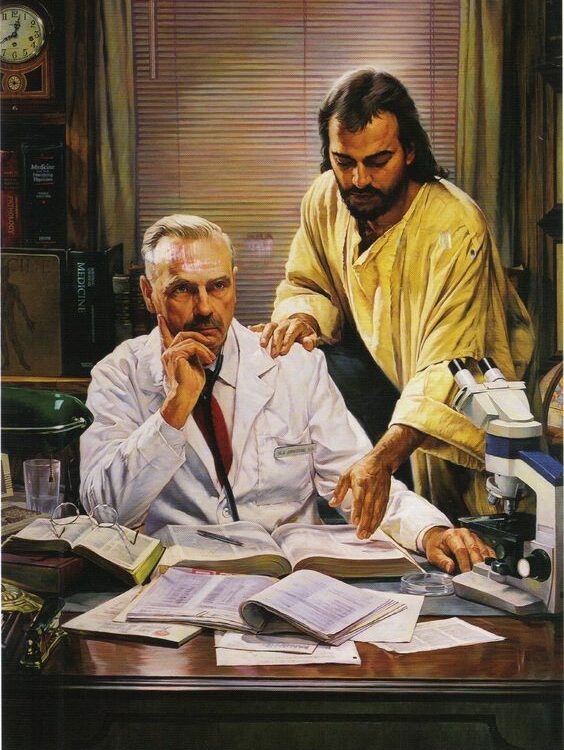
Monthly Family Update – February 2023
February 2, 2023
12 Steps for Spiritual Strength Training and Spiritual Nutrition
February 7, 2023Here’s a January 29, 2023 excerpt (part two of three) from my and Mike Yorkey’s award-winning WWII book, At First Light: A True World War II Story of a Hero, His Bravery, and an Amazing Horse which was published on the Horse Talk website out of New Zeland that I thought you might enjoy.
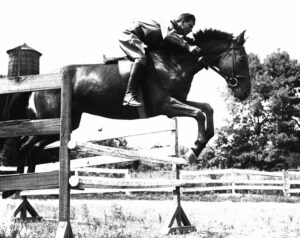
Phil Larimore at home in the US jumping Chugwater (previously known as Tuckern), the horse he rode on the covert “Operation Lipizzaner” mission during WW2. After the war, Phil loved participating with “Chug” in formal foxhunts, where he served as Field Master, riding in shows, and steeplechasing.
Philip B. Larimore, Jr., earned three Purple Hearts (he refused three others), two Bronze Stars, two Silver Stars, and the Distinguished Service Cross for his service with the US Army in World War 2, but even his family did not know the extent of his wartime exploits.
His real-life adventures as one of the youngest and most decorated front-line officers in WW2 have been revealed in the new book At First Light, after painstaking research by Phil’s son Walt Larimore.
Those exploits include a part in the secret mission that Phil Larimore called “Operation Lipizzaner”, outlined in the recent article A hero, his horse, and the secret story of the Lipizzan rescue.
Following on from last week’s excerpt from At First Light, the story of WW2 soldier Phil Larimore, author Walt Larimore tells the story of “Operation Lipizzaner”, revealing Phil’s role in saving Austria’s famous Lipizzaner horses.
For background, read the article A hero, his horse, and the secret story of the Lipizzan rescue.
And don’t miss the first excerpt from Chapter 40: A Secret Mission.
Operation Lipizzaner: Former Nazi vet paves way for horse rescue
Excerpt courtesy of Knox Press, an Imprint of Post Hill Press, © 2022 Walter L. Larimore. All Rights Reserved.
Chapter 41: Operation Lipizzaner
“To find a horse like this, in the middle of this filthy abomination of a war, is for me like finding a butterfly on a dung heap. We don’t belong in the same universe as a creature like this.” — Sir Michael Morpurgo, British author and playwright
 Phil and the pilot quickly exited the plane as several men with baying dogs ran up to greet them. The lead man stuck out his hand, and the canine handlers pulled their dogs back with the leashes.1
Phil and the pilot quickly exited the plane as several men with baying dogs ran up to greet them. The lead man stuck out his hand, and the canine handlers pulled their dogs back with the leashes.1
“We’re ÚVOD,” he said in a thickly accented voice. Phil recognized the acronym of the Czech resistance network as he shook the man’s hand.
“We brought camouflage netting,” the man said. “Let’s push the plane over by the forest edge.”
Several men covered the Cub while others extinguished the lanterns, no longer necessary in the dawn’s first light. The lead man then directed Phil and the pilot to a campfire that the partisans had made next to the woods.
“We’re safe here,” the man said. “Anyone passing will think we are a hunting party.”
“What’s the plan?” Phil asked as cups of dark, piping hot coffee were poured.
At that moment, several hunting dogs began barking, stretching their leashes in the direction of the forest. Two men instantaneously shouldered their rifles, while another pair cautiously walked behind nearby trees. Another partisan rolled behind a log and aimed his rifle in sniper fashion.
At that moment, a single horseman exited the forest’s edge about fifty yards away and pulled his mount to a halt. Even at that distance, Phil was astounded by what he saw. The man, dressed in traditional hunting garb, sat upright on one of the most beautiful horses he had ever seen. The stallion’s grayish-white coat glowed in the dim light. Phil estimated it a bit more than fifteen hands and a stocky 1200 pounds.
The horse nickered, then lowered and shook his massive head. His long white mane flowed from the arched carriage of his sturdy neck and broad, deep chest. His tail was long, well set, and carried high as it swished from side to side, slapping its well-muscled, strong legs with broad joints and well-defined tendons.
“Marvelous. Stunning. Glorious,” Phil whispered to himself. “A Lipizzaner!”
The rider expertly dismounted and led his white horse toward the men. As he approached, Phil noticed another horse in tow — a bay-colored stallion that was a good sixteen hands. His first thought was this: That animal has a mighty ugly head.
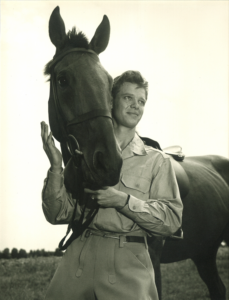
Philip Larimore and Tuckern, later named Chugwater. Image from At First Light.
But the animal was otherwise well-built with an unusual small, white star-shaped marking on the lower middle of his chest. As Phil looked more closely, he noticed the long neck, high withers, deep chest, short back, lean body, good depth of hindquarters, and long legs. Definitely a Thoroughbred, he thought.
The rider shook hands with the men and then turned to Phil. “My name is Captain Lessing,” he said in a German accent. “I’m one of the staff veterinarians at the Hostau stud farm.”
Phil recognized the name from his pre-mission briefing. Lessing had grown up in Mecklenburg, Germany — horse farm territory east of Berlin. He’d joined the Hitler Youth in his teens and had attended veterinary school in Hamburg, graduating in 1939.
“Good to meet you, I’m —”
The captain cut Phil off. “I expect no trouble, sir, but it’s best I don’t know your first or your last name. I do need to know your rank.”
“Lieutenant, Sir. First Lieutenant.”
The captain nodded. “Best we leave these hunters and go about our ride, don’t you think? Are you comfortable on a mount?”
“I am, sir. Have ridden most of my life. I am in awe of your Lipizzaner. He makes even this magnificent Thoroughbred look positively common.”
The captain smiled, turned, and quickly remounted his horse, indicating that Phil should do the same.
As Phil settled into his saddle, under the watchful eye of his host, the captain explained, “Your mount is sometimes a bit lazy and has to be prodded with a spur or soft whistle to run or jump. I call him Tuckern.”
Captain Lessing reined his mighty stallion around and took off at a canter. Phil whistled and reined Tuckern around to follow. Once Phil and Tuckern caught up with them, they trotted together and then slowed to a walk as they entered the dense forest.
“My men and I walk or ride the horses once or twice a day,” the captain said. “That way, if we are seen from a distance, no worries. If someone comes close … well, do you speak any language other than English?”
“I speak pretty good French,” Phil replied. He’d been speaking beaucoup de français ever since the Allies landed in southern France.
“Then I’ll introduce you as a visiting veterinarian from France — a Nazi sympathizer who escaped. What city shall I say you are from?”
“Aix-en-Provence would work. I spent several weeks in a hospital there.”
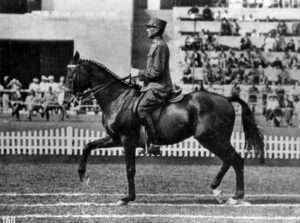
Austria’s Alois Podhajsky and Nero were individual bronze dressage medallists at the 1936 Olympic Games in Berlin. Podhajsky was later the director of Vienna’s Spanish Riding School. © FEI
The captain nodded. “I’m told you’re here to confirm our stock. We’ll ride to the forest edge above the farm. You’ll get a good look from there.”
“You sound German, not Czech.”
The man smiled. “I’m a German Army officer. I was an adjunct to Hitler’s Chief Equerry of Germany and Master of the Horse, Gustav Rau. He’s world-renowned as an expert in breeding horses.”
“I didn’t know Hitler was into horses.”
“It should be no surprise,” Captain Lessing explained, “for two reasons. First of all, as you probably already know, the German Army is heavily dependent upon horses. About 80 percent of their entire transport is equestrian. With the way the war is going, we’re churning through them at a rate of about 6000 killed or lost to disease per month.”
Phil mulled that number. “I’ve seen countless dead and dying horses across France, but I had no idea they lost that many.”
The captain nodded. “The second reason is that Adolf Hitler’s ultimate dream is to create the perfect German — blond, blue-eyed, strong, lean — through selective breeding. He wants to do the same with horses, so he got his hands on what he considered the most perfectly bred horses in Europe. The perfect horses for the perfect humans—‘the quintessential German warhorse,’ he called it.”
“Kinda funny, isn’t it?” Phil wondered aloud.
“What?”
“I mean Hitler’s a short, pudgy, dark-haired man.”
“Who never sat on a horse,” Lessing added, chuckling. “Anyway, Gustav Rau is considered the equestrian equivalent of Hitler, and he set up fourteen stud farms to produce purebreds. He brought prize Arabians from Poland as well as other breeds. But as time went on, he and Hitler became much more interested in the Lipizzaner. They sent me to procure for the Reich all of the Lipizzaner stock from Yugoslavia and Italy. We set up two centers for the Lipizzaners: the one here in Hostau, and another in a small Austrian town, Sankt Martin im Innkreis, about 200 kilometers [124 miles] south of here.
“Herr Rau also had the entire bloodstock of the stud farm owned by the Spanish Riding School in Vienna — stallions, mares, and foals — loaded into specially designed train cars and brought here to Hostau. He gathered any others he found in small pockets scattered around Europe. He corralled virtually every one of the world’s Lipizzaners in these two stud farms, at first fr from the war zone.”
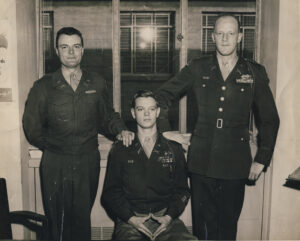
Phil Larimore is pictured seated. His closest friend in the military was Ross Calvert, at right. They were together at Officer Candidate School training at Fort Benning and would fight together in epic battles against the Germans. Image from At First Light
Phil changed the subject. “Are you a Nazi?”
The German captain took a deep breath and slowly released it. Looking into the forest ahead, he softly explained. “As I said, Herr Rau sent me to procure for the Reich all of the Lipizzaner stock from Yugoslavia and Italy. As I toured the Reich, I traveled at the highest level of comfort. One day I was on a train, enjoying a meal in a well-appointed dining car with high-ranking Gestapo and Army officers. I was by far the youngest officer. During a pause at a rail station, as we were all drinking champagne from crystal flutes, a medical train pulled up next to us. I could see cars stuffed with wounded soldiers from the Eastern Front, stacked three deep on tiered bunks. The men looked pitiful and exhausted, wrapped in tattered bandages sodden with blood; they looked only half-alive.”
Lessing paused and shifted in his saddle. “One of the Gestapo ordered his valet to close the curtains. He said, and I remember it like it was yesterday, ‘Those men have no understanding of the National Socialist lifestyle.’ While his fellow Germans were being transported in cattle cars, our horses moved about in plush, padded train cars, specially equipped for their protection, always accompanied by grooms who cared for their every need. I’ve never gotten that out of my mind. I think, for the first time, I’d seen up close and in person the ruthless contempt the party leaders had for their men who were suffering and dying.”
He nudged his horse to begin walking. “Traveling around let me also see the depredations and atrocities being committed by the Reich, especially in Poland. It was awful, Lieutenant. But a trip to Auschwitz …”
Phil remembered reading about the liberation of the Polish concentration camp in late January by the Russians. The reports were awful: Nearly a million Jews had been systematically killed in gas chambers, and their bodies burned in a crematorium. Those who survived were nothing more than skin and bones.
The captain paused, and his eyes moistened. “There, I learned the Reich was gassing the Jews. From my train window, I saw black ashes spewing into the air, blackening the gray sky like a spreading blot of ink. I couldn’t help but recoil, but I could not avert my eyes. It was then that I first thought, If the Germans win this war, there is no God Almighty. The smoky residue settled into my uniform. I could not wash it out. I got a new uniform, but the smell still clings to the inside of my nostrils.”
“Auschwitz has been in all the newspapers since January. But our intelligence knows that there are more — at least a half dozen large concentration camps. Who knows how many smaller ones there are,” Phil said.
The captain continued. “After working for Herr Rau for under a year, I gave up believing in the Nazi cause. In my mind, my vow of loyalty was no longer to the Führer, but only to the horses. Fortunately, it was then that I was assigned to Hostau.”
He looked at Phil directly. “To answer your question, sir, no, I’m not a Nazi — at least not anymore. Certainly not in my heart or soul, even though I’m required to wear the uniform.”
Phil pulled out a pen and small notepad to take notes. “Why do you want us to know about this farm?”
Captain Lessing shook a finger at him. “No notes! It’s too dangerous for you or me.”
Phil apologized and put his notepad away, while willing himself to remember each word, each sentence, and each thought from the captain.
There would be a lot to remember.
Next week, find out what happens next.
Excerpt courtesy of Knox Press, an Imprint of Post Hill Press, © 2022 Walter L. Larimore. All Rights Reserved.

At First Light: A True World War II Story of a Hero, His Bravery, and an Amazing Horse, by Walt Larimore.
At First Light: A True World War II Story of a Hero, His Bravery, and an Amazing Horse
Publisher: Knox Press
ISBN-10: 1642939595
ISBN-13: 978-1642939590
Available from Amazon.com and other online retailers
1. A G-2 is an intelligence officer or section of a major command above the brigade level.
2. Phil was referring to a masterpiece painting by French painter Jacques-Louis David called Napoleon Crossing the Alps, commemorating the crossing that French emperor Napoleon Bonaparte conducted through the Great St. Bernard Pass in May 1800. In reality, he rode a mule over the crest of the Alps, which would hardly be impressive for an emperor looking to enhance his image and legacy.

